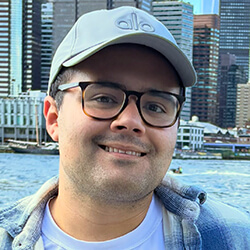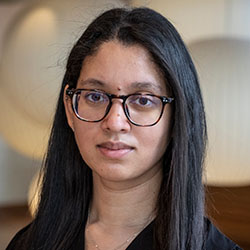Jackson Lab
The Jackson Lab studies the immune mechanisms underlying the development of system autoimmune diseases, focusing in particular on the role of B cells in systemic lupus erythematosus (SLE). The lab uses various chimeric and genetic knock-in murine strains to model the biology of human autoimmune diseases.
Partnership Opportunities

Shaun W Jackson, MD, PhD
Dr. Jackson’s research aims to improve our understanding of the immune pathogenesis of human autoimmune diseases, in particular the role for B cells in Systemic Lupus Erythematosus (SLE). His research has resulted in a number of new insights into the B cell-intrinsic signals underlying lupus pathogenesis and has lent support to an emerging paradigm of humoral autoimmunity in which B cells orchestrate initial breaks in immune tolerance.
-

Shari Cho
Research Scientist II
Shari is a research scientist whose work focuses on the molecular deconstruction of lupus nephritis using single-nuclei RNA sequencing. Her research involves comparative transcriptomic analysis across multiple lupus mouse models and the integration of these findings with human disease datasets to identify conserved pathways of severe kidney injury. Beyond computational biology, she utilizes immunohistochemistry to provide spatial and protein-level validation of genomic findings. Driven by an interest in spatial transcriptomics, she seeks to utilize precision data science to accelerate clinical discoveries for children with immune-mediated kidney diseases.
-

Heidi Creed, PhD
Postdoctoral Researcher
Heidi is a postdoctoral fellow who brings a strong background in kidney physiology, lymphatics, immunology, and bioinformatics to the lab. She utilizes advanced techniques such as high-parameter flow cytometry, single-cell RNA sequencing, and spatial transcriptomics to deeply characterize renal physiology and function in the context of lupus nephritis. Heidi's research is driven by the long-term goal of intersecting the fields of big data, immunology, and kidney physiology, to identify novel mechanisms of disease and pinpoint novel therapeutic options. This work will provide the foundation for more targeted and successful treatments, significantly impacting patient care.
-

Nicholas Hasle, MD, PhD
Pediatric Rheumatology Fellow
Nick is a physician–scientist and pediatric rheumatology fellow whose research sits at the intersection of immunology, nephrology, and computational biology. He is developing expertise in lupus nephritis and tubulointerstitial nephritis and uveitis by leveraging cutting-edge single-cell and spatial transcriptomic approaches to dissect immune–kidney interactions at cellular and tissue scales. By integrating high-dimensional molecular data with clinical insight, Nick aims to define pathogenic immune niches and uncover mechanisms of renal injury and repair. His long-term goal is to translate systems-level discoveries into precision therapies that improve outcomes for children with immune-mediated kidney disease.
-

Sebastien Lewis
Research Scientist II
Sebastien is a research scientist in the Jackson Lab at Seattle Children’s Research Institute, where he studies how STAT1 gain-of-function mutations disrupt immune tolerance and drive autoimmunity. Using conditional mouse models, high-parameter flow cytometry, and kidney histology, he defines how B cell–intrinsic STAT1 signaling contributes to lupus-like disease. He previously contributed to studies on NADPH oxidase (NCF1) function in B cells and currently assists with evaluating CD19-targeted therapies for autoimmune disease. Sebastien’s long-term goal is to build on his immunology background to contribute to scientific advancement — whether through graduate research or by applying his expertise to intellectual property and patent law.
-

Misael A Licea Gomez
Research Scientist I
Driven by the complexities of systemic lupus erythematosus (SLE), Misael’s research focuses on the intersection of targeted immunotherapy and the pathogenesis of systemic autoimmunity. He investigates the fundamental mechanisms of BiTE-mediated cell depletion and the subsequent remodeling of the immune compartment. His work is dedicated to identifying the critical factors that govern the resolution of pathogenic activity, with the goal of optimizing the logic and timing of therapeutic interventions in chronic disease.
-

Neelakshi Mungra, PhD
Postdoctoral Researcher
Prior to joining Dr. Shaun Jackson's lab, Mungra completed her postgraduate work at the Medical Biotechnology and Immunotherapy Research Unit (MB&I) at the University of Cape Town in South Africa, where she specialized in the development of modular antibody technologies aimed at facilitating precision medicine in oncology by differential diagnosis and immunotherapy. With a better understanding of the disease-specific cell surface profiles of patient biopsies, the field of targeted drug development can be expedited and tailored according to surface marker-specific patient groups best responding to specific immunotherapy or precision medicine. This is especially apparent in the management of a daunting disease like breast cancer. Mungra was recognized for her outstanding academic performance and contribution to society by the Research Excellence Award for Next Generation Researchers at the 2021 award ceremony of the National Research Foundation (NRF) of South Africa.
-

Erica Peres Verratti
Research Scientist I
Erica is a research scientist at Seattle Children’s Research Institute whose interest in autoimmune therapeutics was sparked in her youth, following her diagnosis with an autoimmune disorder at Seattle Children’s. In the Jackson Lab, she investigates the impact of bispecific T cell engagers (BiTEs) on autoimmunity. Her work focuses on defining the effect of CD19xCD3 BiTE-driven B cell depletion on disease outcomes in animal models of systemic lupus erythematosus (SLE), using high-parameter flow cytometry and ELISA-based immune profiling to quantify immunological changes. She is also interested in further characterizing CD19xCD3 BiTE, including its impact on memory B cell populations.
